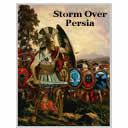Alexander the Great
Alexander the Great is the stuff of legend when it comes to ancient military history. Armed with youth, cunning and a brilliant tactical mind, his thirteen-year reign led to the formation of one of the largest empires the world has ever seen. The aptly titled Alexander the Great crafts the highlights of his extraordinary story with grand scope and meticulous research.
Alexanderќs reign was marked by nearly constant battle. Utilizing all the skills and drives he inherited from his father Phillip II, Alexander set out to overtake the Persian Empire in 334 BC in what proved to be one of the most daunting military campaigns in history. He was only 20 at the time.
The film features a collage of impressive computer animations, artistic renderings, and detailed maps that effectively break down each battle along the way. We are witness to both Alexander's strategic brilliance and insatiable bloodlust. One such anecdote of the latter involves one of his most treasured soldiers and friends - Cleitus the Black – whom he disposed of during a drunken quarrel.
The film outlines Alexander's astounding prowess on the battlefield, including the unique formations of his armies and the escalated staging of his attacks one city and region at a time. While the filmmakers are mostly concerned with the intricacies of Alexander's battles, they also pay careful attention to the psychology of the man - his paranoia, determination and off-putting arrogance. We learn of his marriage to Roxana, his untimely death at the age of 32 from suspicious causes, and the brutal fates that awaited his closest confidantes in the wake of his reign. At the time of his death, he was undefeated and conquered lands from Greece to Pakistan.
The film deals in a complicated history that's filled with dozens of figures who could all demand a documentary of their own. It's to the film's credit that all of these characters, locations and details are made digestible by the remarkable scripting of the narration.
Alexander the Great is a tremendously watchable and instructive journey through a thrilling and brutal period of world history. Military history buffs will be especially taken by it.
Directed by: Toby Groom




How long, how many centuries have to pass before people who call themselves "civil" will stop glorifying systematic murder/suicide? Is a person who starts wars "great"? Is it noble to be a person who lives by violence, e.g., to be a soldier? Soldiers are sold as defenders, but they are not allowed to question an order to commit offense, nor police their bloodthirsty fellow soldiers. The moral are trapped in an immoral vocation. And for some it is a fate worse than death, hence the high suicide rate and drug use (attempt to escape from their conscience). A moral society cannot justify/explain the contradiction of initiating violence against the innocent or supporting it in word or deed.
This worship, this faith in force, is irrational, self-destructive, and unsustainable.
Truism
You keep living your little life and crying your little tears while playing your little violin, but the real world was not built on the morals you spit from your fingertips. No one can answer your questions because they are something each person needs answer for themselves and then commit to them once they have, for their own mental health and long life. However, I can tell you that your frustration is in itself immoral when applied to historical events. Try as you may, the past can't be changed and it will always affect the future (as it should), otherwise we might as well start heating our homes with the pages it’s written on, while simultaneously doom future generation to repeating our greatest mistakes, over and over again...
Mahatma Gandhi used his status to sway the government to his wishes through his will to starve himself to near death in protest, knowing that should he die, Indian rivers would run red for decades, yet he preached peace and none violence above all else. People that make the history books aren’t there because they are blood thirsty villains, they are there because they are the ones that brake the norms of society and bust through the berries of the social systems/abilities that exist at the time. We hold them up on our shoulders so that the “special ones”, of each generation to come, remember what it takes to be “great” and continue to make the world great.
Unfortunately, today we teach/indoctrinate the whole of people at a young age into thinking they are all “special ones”, rather than letting, genetics, time, effort, and knowhow work it out for us. I’d say its cause a lot of confusion and paralysis in society, which has led to monumental mental health issues riddling the population.
Unsustainable? He's legacy has lasted for thousands of years. And he will be talked out and studied for thousands more. You're ability to seat there and moralize is only possible through the amorality of your ancestors that has provided you the peace you enjoy.